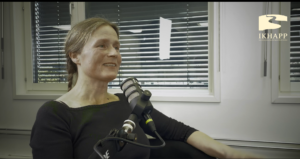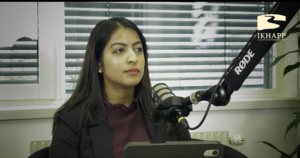Podcast: Can the use of plastic products in agriculture be made sustainable?
Listen to the first episode of IKHAPP’s podcast with plastic experts Richard H. Thompson and Kristina Thygesen. They discuss how the new plastics treaty could help achieve a sustainable use and waste management of plastics in agriculture and the role of policymakers and scientists.
Plastic is increasingly becoming an important asset in global agriculture. Many stages of agricultural production rely on plastics, especially in so-called protected cultivation systems, which include greenhouses, mulching films, protection nets, and so on.
Global agriculture produces 12 million tons of plastic waste every year, with a substantial fraction probably undergoing some form of mismanagement. During use and at the end of their life cycles, these plastics can degrade and their debris accumulate in soil. Similarly, the circular use of organic waste, such as sewage sludge, compost, and digestates, as fertilizers can introduce large quantities of plastics into farm soil. Science has begun recognizing the negative impacts of this pollution on soil ecosystems and fertility.
- Kristina Thygesen
- Diya Chakravorty
- Richard H. Thompson
Agricultural plastics and circularity of organic waste are emerging among the options available today for promoting efficient and reliable food production. However, it is urgent to determine how to deploy these strategies in a sustainable way while preventing pollution.
In the podcast episode, Richard H. Thompson and Kristina Thygesen debate this topic and give insights on how policy makers and stakeholders operating along the agrifood value chain can contribute to make the use of plastic in agriculture more sustainable.
- Richard H. Thompson is an independent chemicals and waste consultant and a co-author of the 2021 report from the Food and Agriculture Organization of the United Nations (FAO) titled: “Assessment of agricultural plastics and their sustainability: A call to action.”
- Kristina Thygesen is a senior expert at Grid-Arendal and authored the 2021 UNEP working paper: “Plastics in agriculture: sources and impacts.”
The discussion is moderated by IKHAPP team member Diya Chakravorty.
Listen to the podcast on Spotify or Apple Podcasts.
While launching this podcast, IKHAPP invites all experts interested in agricultural plastics to participate in the FAO Survey “Towards the development of a Voluntary Code of Conduct on the sustainable use of plastics in agriculture”. Please give your feedbacks by Tuesday 7. November.


